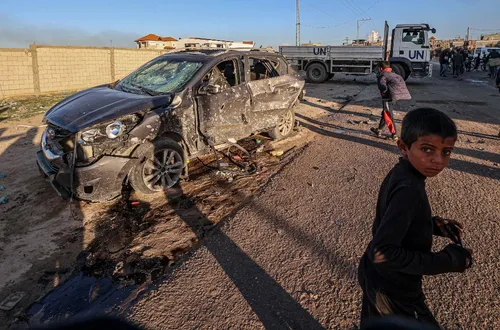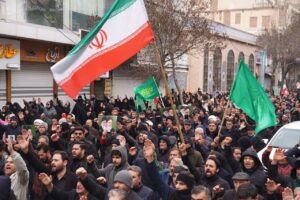
Last Friday (26), the International Court of Justice in The Hague (ICJ), the UN’s highest court, issued a provisional decision requested by South Africa accusing Israel of genocide against Palestinians in the Gaza Strip. In doing so, the court decided to investigate the serious allegations under its jurisdiction, considering that the allegations made by South Africa are credible and relevant.
The trial may take years to conclude, but just reaching this stage is a historic event. Never before has a country located at the center of “Western” power been investigated for genocide in an international court.
Although the State of Israel has been singled out for decades for its systematic and ongoing violations of human rights and international law, as well as having a long history of non-compliance with UN resolutions, this will be the first time that it will have to legally answer for its actions.
The court’s decision affects the entire “Western international community” and the “rules-based world” they claim to defend. As soon as the complaint was filed, the State of Israel announced that it would challenge the case because it was a “blood libel” – a reference to the false accusations used to persecute the Jewish community. Washington and London immediately rushed to dismiss the complaint as “baseless” and “senseless.”
However, the vast majority of judges at the UN’s highest court did not consider the complaint “unfounded”, much less “senseless”. During the reading of the provisional decision, the president of the court, Joan E. Donoghue, explained for more than 45 minutes the reasons why she believes that the Palestinian people could be suffering genocide in Gaza.
Donoghue called the current situation a “true human tragedy” and denounced “the particularly grim situation of children in the Gaza Strip.
Numbers
The figures reflect the horror that the Palestinian people are going through. In the Gaza Strip, to date, more than 26,750 Palestinians have been murdered. There are more than 8,000 missing in the rubble, 65,600 injured, while more than 85% of the population was forcibly displaced from their homes (1.93 million people). At the same time, the events surrounding the horror in the territory are systematically silenced: to date, more than 120 journalists have been murdered.
The World Health Organization estimates that 1 in 4 families are in “catastrophic” conditions and are at risk of starvation. More than half of Palestinian homes were destroyed in the attacks. At the same time, 378 educational centers and 221 places of worship have been demolished, and the medical system has completely collapsed.
According to Article 2 of the International Convention on Genocide, any action that “deliberately imposes on the group conditions of life intended to bring about its physical destruction, in whole or in part” is considered part of genocidal intent. Thus, the destruction of the conditions that make life possible in Gaza can also be considered a genocidal act.
Therefore, the court accepted six of the nine provisional measures requested. These measures are mandatory in nature and must be implemented immediately, with the aim of preventing the continuation of a possible genocide while the events are being investigated. The measures include allowing humanitarian aid to enter Gaza, stopping physical and psychological harm to the population and ensuring that no evidence is destroyed that could compromise the investigation.
Furthermore, based on the documentation presented by South Africa, the court points to statements by important members of the government of the State of Israel as possible evidence that would demonstrate genocidal intent. In particular, it mentions President Isaac Herzog, Defense Minister Yoav Gallant and Foreign Minister Yisrael Katz.
Term
The court gave Israel one month to submit a report on its compliance with the court’s orders. At the same time, the Court’s decision invokes article 3 of the Genocide Convention, which states that complicity with a genocidal state constitutes a crime. Thus, if it is determined that the Palestinian people are suffering genocide, any country or entity that collaborates with the State of Israel can be named as an accomplice.
This decision points directly to the “heart of the West.” In the UN Security Council alone, the United States vetoed 52 resolutions against Israel’s policies. While, last November alone, the US Congress approved US$14.5 billion (more than R$70 billion) in “extraordinary military aid”.
Consequences
Consulted by Brazil in facthuman rights expert Francis Boyle – who was the first to win genocide prevention cases – says that while Israel is likely not to comply with the ICJ’s orders, the sanctioning of provisional measures “opens the door to a series of measures that can be taken under international law in the event that Israel does not respect the decision.”
“Like any other legal procedure, you go to the judge to get an order. But the judge doesn’t enforce the order, it’s enforced by the sheriff,” explains Boyle.
“Under the terms of the UN charter, the Security Council is the sheriff. If the US or the UK veto any enforcement action against Israel at the council – which they do systematically – South Africa can take that order to the UN Security Council to demand its execution”.
Bayle points out that if this were to happen, the consequences could be “quite serious” for Israel. The General Assembly could suspend Israel’s participation in its activities. “The same thing that the General Assembly did against the criminal apartheid regime in South Africa and also against my adversary, genocidal Yugoslavia”, he exemplifies.
In turn, the General Assembly could recommend that its member states adopt economic sanctions against Israel and admit Palestine as a full member state of the UN – currently, it only has the status of an observer state.
“The votes to admit Palestine are there,” Boyle said. “The importance of this is that in the entire history of the UN General Assembly – dating back to 1945 – no member state has ever been destroyed. Meanwhile, Israel and Zionists around the world want to destroy Palestine and inflict a second Nakba on the Palestinians The inclusion of Palestine in the UN is important to protect them”, he adds.
Next reactions
The Israeli defense is likely to suffer a further setback in the coming weeks. In 2022, the Independent International Commission of Inquiry into the Occupied Palestinian Territories, created by the UN, stated in a report to the General Assembly that it had “reasonable grounds” to consider the Israeli occupation illegal under international law. Furthermore, he pointed out Israeli policies of de facto annexation of occupied territories.
Following this report, the General Assembly asked the ICJ for a non-binding ruling on the issue, which will be published on February 19.
Consulted by Brazil in factthe international law expert and member of the organization Law for PalestineHassan Ben Imran, assures that, if the ICJ considers the Israeli occupations illegal, this would imply the collapse of the argument of self-defense:
“This means that Israel cannot claim the right to self-defense, because it is illegally occupying the country. Thus, aggression against Palestine is a continuation of aggression, the illegal use of force, and not self-defense. From the point of view of law international, instead of being the attacked, Israel would now be the aggressor”.
International reactions
As soon as the decision became known, Israel’s ultra-right Prime Minister, Natanyahu, adopted a strategy of criticizing the UN with the aim of changing the focus of the international debate. He quickly referred to the verdict as a “vile attempt to deny Israel its fundamental right to self-defense”, calling the court’s measures “blatant discrimination against the Jewish State”.
The idea of discrimination against the “Jewish State” is not new. Often, the defense of the State of Israel claims that attacks on its policies amount to anti-Semitic attacks on the Jewish people.
Indictment
Just two days before the announcement of the provisional decision, Tel Aviv circulated among its allies an alleged intelligence report that claimed to gather evidence that 12 members – of the 13,000 Palestinian employees – who work for the United Nations Relief and Works Agency for Refugees from Palestine in the Near East (UNRWA) were involved in attacks on Israel.
UNRWA was established in 1949 by mandate of the General Assembly, following the creation of Israel. It currently provides assistance to more than 5.6 million Palestinians in the occupied territories, including Jerusalem, as well as refugees – who have been expelled from their territories – living in Syria, Lebanon and Jordan.
Interestingly, on the same day as the court’s verdict, the international repercussions of Israel’s accusation against UNRWA – the evidence for which so far consists only of word from Tel Aviv – became known.
Immediately, several Israeli allies – led by the US, Canada, UK, France, Germany, Italy, the Netherlands, Austria, Finland, Japan, Australia and others – announced they were suspending their aid to the agency. This means that 5.6 million people will be in a situation of extreme vulnerability.
At a press conference in Geneva on Wednesday (30), WHO spokesman Christian Lindmeier denounced that “criminal activity can never go unpunished. But the discussion at the moment is more of a distraction from what is actually happening every day, every hour, every minute in Gaza. It’s a distraction from the nearly 27,000 deaths so far, 70% of which are women and children.”
UNRWA’s complaint seeks, at least in the short term, to avoid media sanction in relation to the Court’s decision. But at the same time, it attacks the credibility of UNRWA, an agency whose work is among the sources considered in the Court’s decision in its assessment of the situation of the Palestinian people. In this way, the attack on UNRWA weakens the basis and logic of the ICJ’s decision.
Editing: Rodrigo Durão Coelho
Source: www.brasildefato.com.br

